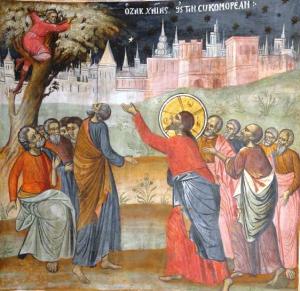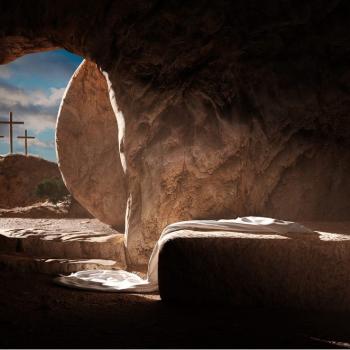
The story of Zacchaeus will be familiar to anyone who went to Sunday School, as will the cheerful little ditty this post is named after. Stories that become familiar in childhood can lose impact, and are worth revisiting with adult eyes. Personally I love this story, because the miracles contained are all of the human heart. First, the story, from Luke 19:
‘Jesus entered Jericho and was passing through. And there was a man called by the name of Zacchaeus; he was a chief tax collector and he was rich. Zacchaeus was trying to see who Jesus was, and he was unable due to the crowd, because he was short in stature. So he ran on ahead and climbed up a sycamore tree in order to see Him, because He was about to pass through that way. And when Jesus came to the place, He looked up and said to him, “Zacchaeus, hurry and come down, for today I must stay at your house.” And he hurried and came down, and received Him joyfully. When the people saw this, they all began to complain, saying, “He has gone in to be the guest of a man who is a sinner!” But Zacchaeus stopped and said to the Lord, “Behold, Lord, half of my possessions I am giving to the poor, and if I have extorted anything from anyone, I am giving back four times as much.” And Jesus said to him, “Today salvation has come to this house, because he, too, is a son of Abraham. For the Son of Man has come to seek and to save that which was lost.”’
We can see from the passage that Zacchaeus was an unpopular person. I won’t linger on that, as it is well understood. The man earned his wealth by working for the enemy occupier, taking money directly from his neighbours, so his pariah status isn’t much of a surprise. I’m much more interested in what happened in his heart as he began to be drawn to Jesus.
The passage references a single reason for climbing the tree – ‘he wanted to see who Jesus was’ – but Zacchaeus was motivated by far more than simple curiosity. By the inspiration of the Holy Spirit, Jesus was able to perceive what was in the hearts of those around him. Luke 5, 22-23:
‘But Jesus, aware of their thoughts, responded and said to them, “Why are you thinking this way in your hearts? Which is easier, to say: ‘Your sins are forgiven you,’ or to say, ‘Get up and walk’?’
Mark’s account of this same event gives us insight into the spiritual dynamics of this miraculous perception: Mark 2, 8:
‘Immediately Jesus, aware in His spirit that they were thinking that way within themselves, said to them…’
Matt 12, 25: ‘And knowing their thoughts Jesus said to them, “Any kingdom divided against itself is laid waste; and any city or house divided against itself will not stand…”’
Matt 22, 18: ‘But Jesus perceived their malice, and said, “Why are you testing Me, you hypocrites?”’
Luke 6, 8: ‘But He knew what they were thinking, and He said to the man with the withered hand, “Get up and come forward!” And he got up and came forward.’
John 1, 47-48: ‘Jesus saw Nathanael coming to Him, and said of him, “Here is truly an Israelite, in whom there is no deceit!” Nathanael said to Him, “How do You know me?” Jesus answered and said to him, “Before Philip called you, when you were under the fig tree, I saw you.”’
These are just a few examples of a ubiquitous truth in the Gospels – that Jesus, through the revelation of the Holy Spirit, could perceive people’s thoughts, and the state and intentions of their hearts. In the case of Zacchaeus, I propose that he could feel the man’s hunger for righteousness. Talk of Jesus would have been fizzing from the lips of his community. Perhaps he had heard of the many miracles Jesus performed. Whatever it was that Zacchaeus heard, it had made him spiritually hungry, and Jesus must have sensed it, because by the inspiration of the Spirit he knew Zacchaeus’ name and was drawn to him like a magnet, singling him out from among the crowd:
“Zacchaeus, hurry and come down, for today I must stay at your house.” And he hurried and came down, and received Him joyfully.
This divine interaction is telling. In the power and presence of the Holy Spirit, Jesus told him he was coming to stay at his house, and Zacchaeus was filled with joy. This is a typical response to meeting Jesus, especially for the first time. In the power of the Holy Spirit, much can be achieved in just a few moments.
The crowd didn’t like Jesus’ choice to stay at Zacchaeus’ house one bit. They didn’t think a corrupt man deserved Jesus’ attention, which by implication means they considered themselves more worthy recipients. The essence of self-righteousness is believing you can merit the favour and approval of God through your own goodness. The crowd then, were not in a place to receive Jesus, because they were compelled by their own righteousness. Zacchaeus, on the other hand, was in exactly the right place to receive Jesus, because he knew he was deeply flawed. He understood that the company of Jesus was a gift, and as we will see, was ready to turn his life around in response to grace. On hearing the complaints of the people around him, which must have been vocal, Zacchaeus revealed the readiness of his heart:
‘But Zacchaeus stopped and said to the Lord, “Behold, Lord, half of my possessions I am giving to the poor, and if I have extorted anything from anyone, I am giving back four times as much.”’
There’s something in the phrase, ‘Zacchaeus stopped’. He could have just walked on with Jesus, ignoring them. If he believed himself somehow worthy of Jesus’ attention, certainly he would have done so, but he stopped because the crowd’s accusation was true – he was a sinner, an extortionist, a hoarder of wealth, a selfish, greedy man – or at least he had been until that moment. He heard the criticism of the crowd, but instead of responding to them, he responded directly to Jesus. They had only exchanged a few words, but he’d reached a place of repentance before they’d walked more than a few yards.
In that moment, Zacchaeus was in a profoundly spiritual state, and turned from the most consequential of his sins; greed. The love of money had consumed him, compromised him, and occupied the largest part of his affection, but in the presence of Jesus, the very thing he’d clung to, hidden behind and relied upon was suddenly nothing to him. I think we have to trust his sincerity when he vowed to give half his possessions to the poor, because if we don’t, we abandon belief in Jesus’ ability to know the human heart. Jesus was not duped, therefore Zacchaeus’ response was for real. The man was lost in love for God, caught up in the most wonderful miracle of all – the miracle of salvation.
And Jesus said to him, “Today salvation has come to this house, because he, too, is a son of Abraham. For the Son of Man has come to seek and to save that which was lost.”
This is a supernatural interaction. Only the power of the Holy Spirit, and the loving presence of Jesus, can bring about such an instant and sincere change of heart. I have seen it happen many times on the mission field, and am hungry to be part of more divine interactions here in the West, where hearts and minds are currently opening to spirituality.
I love the story of Zacchaeus. It reveals the inner mechanism of salvation, and the complete commitment of a heart responding to the love of God. It demonstrates that Jesus is the good shepherd, yearning to find lost sheep. It encourages us to refrain from judgement, whatever a person’s past or present. It shows us God’s readiness to extend immediate and unconditional grace to the hungry heart. It reminds us the fields are ripe for harvest. Finding the lost is Jesus’ deepest passion, the very heart of his ministry, and he feels the same today as he did when he walked the Earth.
Lord give us eyes to see the hunger in human hearts, to know who is ready to receive you. Give us the courage to reach out with your love. Help us attune ourselves to the Holy Spirit, and follow his leading. Let us be effective for you, Lord Jesus, by being your hands and feet in the Earth, and carrying the blazing torch of grace into dark spaces. Amen.















